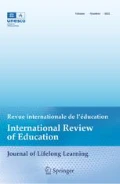Abstract
The paper offers an analysis of the results of the first country-wide survey of the informal learning practices of adults in Canada, conducted in 1998. The survey was based on expanded conceptions of both learning (including informal learning and continuing education as well as schooling) and work (including community volunteer work and housework as well as paid employment). Respondents were found to be devoting unprecedented amounts of time to learning activities, including an average of 15 hours per week in informal learning projects. The patterns and interrelations of all of these dimensions of work and learning are summarized. Multiple dimensions of the underemployment of achieved learning in paid employment are briefly identified. The existence of widespread underemployment suggests that we are living in a knowledge society but not yet in a knowledge-based economy. The paper concludes with possible implications of the empirical research findings using these expanded conceptions of learning and work for policy and program initiatives.
Similar content being viewed by others
References
Aarts, S. et al. 1998. A Slice of the Iceberg: Cross-Canada Study on Prior Learning Assessment and Recognition. Toronto: Cross-Canada Partnership on PLAR.
Adams, M. et al. 1998. Preliminary Bibliography of the Research Network for New Approaches to Lifelong Learning (NALL). Toronto: Centre for the Study of Education and Work, OISE/UT.
Belanger, P. and Valdivielso, S., eds. 1997. The Emergence of Learning Societies: Who Participates in Adult Learning? Oxford: Elsevier Science.
Betcherman, G., McMullen, K. and Davidman, K. 1998. Training for the New Economy. Ottawa: Canadian Policy Research Networks.
Candy, P. 1993. Self-Direction for Lifelong Learning. San Francisco: Jossey-Bass.
Engestrom, Y. 1992. Interactive Expertise: Studies in Distributed Working Intelligence. Helsinki: Department of Education, University of Helsinki.
Johnson, R. 1979. Really Useful Knowledge: Radical Education and Working Class Culture, 1790– 1848. In: J. Clarke, C. Critcher and R. Johnson, eds., Working Class Culture (75–102). London: Hutchinson.
Lave, J. 1988. Cognition in Practice: Mind, Mathematics, and Culture in Everyday Life. Cambridge: Cambridge University Press.
Livingstone, D. W. 1997. The Limits of Human Capital Theory. Policy Options 18(6): 9–13.
Livingstone, D. W. 1999. The Education-Jobs Gap: Underemployment or Economic Democracy. Boulder: Westview Press, and Toronto: Garamond Press (paperback edition).
Livingstone, D. W. Forthcoming. Reproducing Educational Inequalities in a Learning Society: Conceptual Steps and Recent Canadian Findings on Barriers to Adult Education. The Canadian Journal for the Study of Adult Education.
Livingstone, D. W., Hart, D. and Davie, L. E. 1999. Public Attitudes Toward Education in Ontario 1998: Twelfth OISE/UT Survey. Toronto: University of Toronto Press.
McEwen, R. 1998. Narrowing Opportunities for Adults in Ontario Secondary Schools. Toronto: Ontario Secondary School Teachers' Federation.
OECD. 1998. Lifelong Learning: A Monitoring Framework and Trends in Participation. In: Centre for Educational Research and Innovation, Education Policy Analysis 1998 (7–24). Paris: OECD.
Sawchuk, P. 1996. Working Class Informal Learning and Computer Literacy. M.A. Thesis, University of Toronto.
Sheak, R. 1994. The Chronic Jobs' Problem in the United States: No End in Sight. Free Inquiry in Creative Sociology 22(1): 23–32.
Spear, G. E. 1988. Beyond the Organizing Circumstance: A Search for Methodology for the Study of Self-Directed Learning. In: H. Long and associates, eds., Self-Directed Learning: Application and Theory. Athens, GA.: University of Georgia Adult Education Department.
Tough, A. 1971. The Adult's Learning Projects. Toronto: OISE Press.
Tough, A. 1978. Major Learning Efforts: Recent Research and Future Directions. Adult Education Quarterly 28(4): 250–263.
Tough, A. 1979. The Adult's Learning Projects: A Fresh Approach to Theory and Practice in Adult Learning. Toronto: OISE Press.
Author information
Authors and Affiliations
Rights and permissions
About this article
Cite this article
Livingstone, D.W. Researching Expanded Notions of Learning and Work and Underemployment: Findings of the First Canadian Survey of Informal Learning Practices. International Review of Education 46, 491–514 (2000). https://doi.org/10.1023/A:1026522810394
Issue Date:
DOI: https://doi.org/10.1023/A:1026522810394




